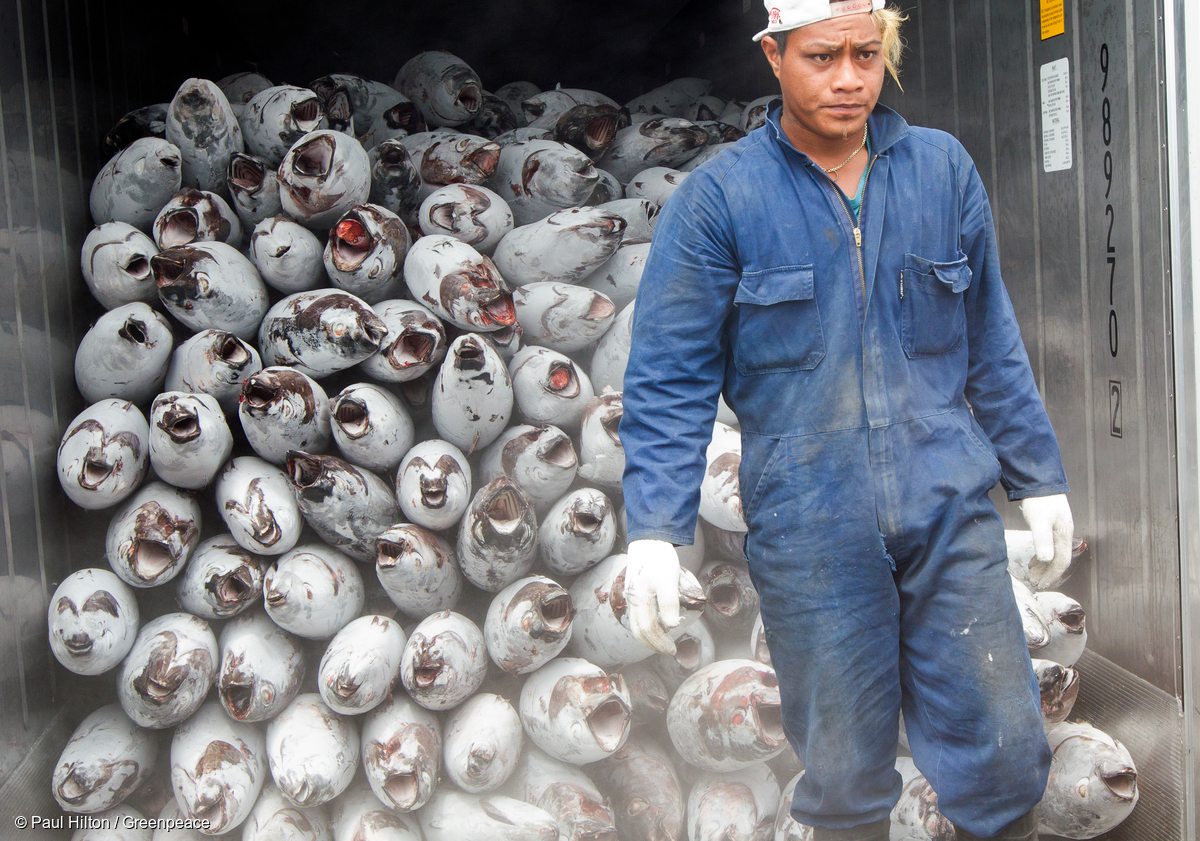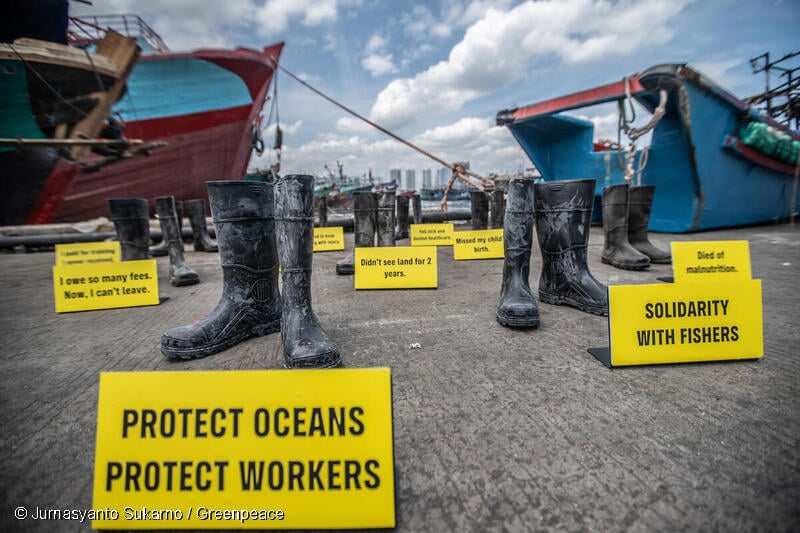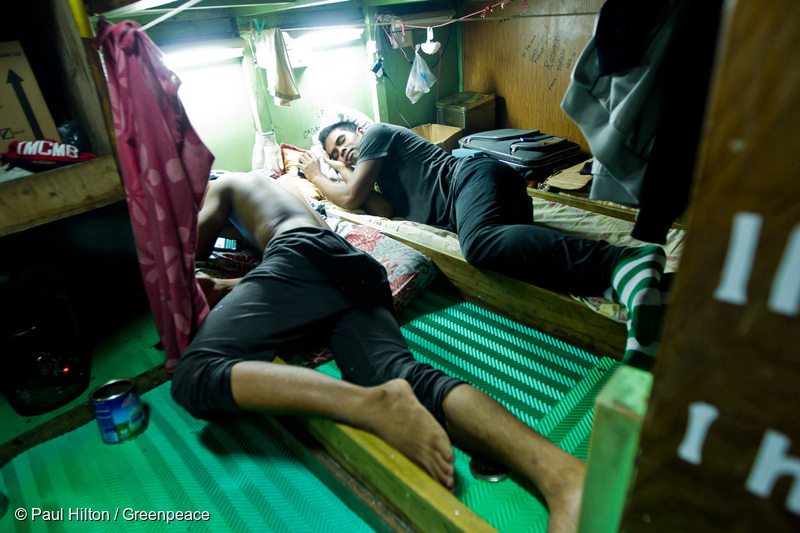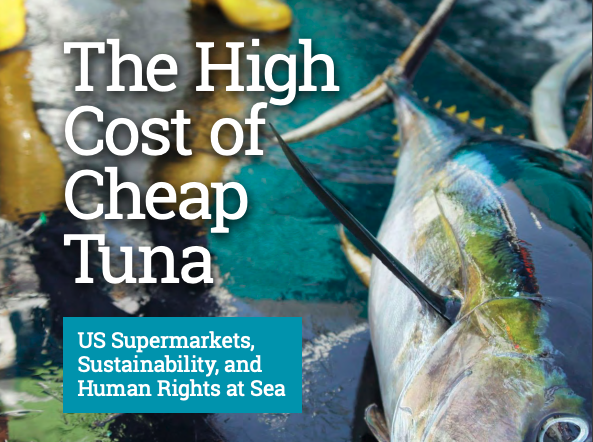The U.S. Department of Labor (DOL) has again included Taiwan-caught fish in its List of Goods Produced by Child Labor or Forced Labor. Taiwan was first listed in the DOL’s report in 2020 after several investigations and reports by Greenpeace East Asia, Greenpeace South East Asia, and other civil society monitoring organizations confirmed the existence of systemic forced labor in the Taiwanese fishing industry. The Taiwanese government has taken incremental steps to address the issue, which have so far failed to disrupt the practice.

Greenpeace travels into the Pacific to expose out of control tuna fisheries. Tuna fishing has been linked to shark finning, overfishing and human rights abuses.
The U.S. Department of Labor (DOL) has again included Taiwan-caught fish in its List of Goods Produced by Child Labor or Forced Labor. Taiwan was first listed in the DOL’s report in 2020 after several investigations and reports by Greenpeace East Asia, Greenpeace South East Asia, and other civil society monitoring organizations confirmed the existence of systemic forced labor in the Taiwanese fishing industry. The Taiwanese government has taken incremental steps to address the issue, which have so far failed to disrupt the practice.

Greenpeace travels into the Pacific to expose out of control tuna fisheries. Tuna fishing has been linked to shark finning, overfishing and human rights abuses.
Washington DC, (September 29, 2022) – The U.S. Department of Labor (DOL) has again included Taiwan-caught fish in its List of Goods Produced by Child Labor or Forced Labor. Taiwan was first listed in the DOL’s report in 2020 after several investigations and reports by Greenpeace East Asia, Greenpeace South East Asia, and other civil society monitoring organizations confirmed the existence of systemic forced labor in the Taiwanese fishing industry. The Taiwanese government has taken incremental steps to address the issue, which have so far failed to disrupt the practice.
In response, Mallika Talwar, Senior Oceans Campaigner at Greenpeace USA, said: “The decision by the Department of Labor to keep Taiwan on the list confirms what members of the Greenpeace network highlighted in a recent investigation: that forced labor issues are still persistent and widespread in the Taiwanese distant-water-fishing industry. However, while government action is important for resolving this problem, it must be supported by changes in the private sector. American brands and retailers that source from Taiwanese fleets need to do more to ensure that their products are not tainted with forced labor. We have seen companies such as Bumble Bee sourcing tuna from the Taiwanese-owned and operated vessel, the Da Wang, which has been confirmed by the U.S. Customs and Border Protection as using forced labor. Taiwan’s continued inclusion in this list should be a wake-up call for these companies to take action to end forced labor in their supply chain. Goods produced by forced labor should not be sold in the U.S. or anywhere in the world.”
In September, Greenpeace East Asia released a report that traced the supply chain of U.S. brand Bumble Bee. As part of the investigation, hundreds of Bumble Bee tuna cans were collected from U.S. supermarkets, and their codes were entered into Bumble Bee’s consumer transparency system, “Trace My Catch” (TMC). The data was then cross-checked with the Taiwan Fisheries Agency and Global Fishing Watch, an open-access tool that analyzes global fishing activity. The investigation found that some of the Taiwanese-flagged/owned vessels that Bumble Bee was sourcing from had violated Taiwanese fishery regulations and were on the Taiwan Fisheries Agency’s (TFA) illegal, unreported, and unregulated (IUU) list. Further, indicators of forced labor were identified in the reports of fishers that worked aboard six of the vessels that supplied Bumble Bee. The U.S. consumer brand is owned by the Taiwanese Fong Chun Formosa company (FCF), one of the world’s largest tuna traders.
Yuton Lee, Oceans Campaigner at Greenpeace East Asia (Taipei) said: “Taiwan’s inclusion on the list again sends a solid alarm to the Taiwanese government and the distant water fishing industry. While there have been some commitments, such as a wage increase for migrant fishers and the hiring of more inspectors to carry out labor checks, it’s far from enough to change this current system that is seemingly designed to exploit people and our ocean. In our latest investigative report, we interviewed migrant fishers who worked on Taiwanese fishing vessels, and they all either experienced or witnessed suspected forced labor. A fisher was reportedly beaten and threatened with knives onboard a vessel, while others reported having only four hours of sleep a day on a different vessel. FCF and many other seafood companies are taking advantage of the vulnerability of fishers. When seafood companies fail in their responsibilities to ensure the fish they purchase are free from human rights abuses, migrant fishers will continue to bear the consequences of mistreatment, and, sadly, sometimes even death. We need better monitoring and transparency from the government and leading seafood companies like FCF to stop this exploitation.”
###
Greenpeace USA is part of a global network of independent campaigning organizations that use peaceful protest and creative communication to expose global environmental problems and promote solutions that are essential to a green and peaceful future. Greenpeace USA is committed to transforming the country’s unjust social, environmental, and economic systems from the ground up to address the climate crisis, advance racial justice, and build an economy that puts people first. Learn more at www.greenpeace.org/usa.



